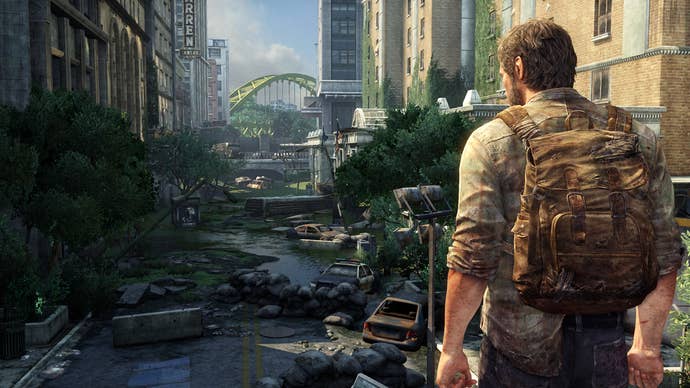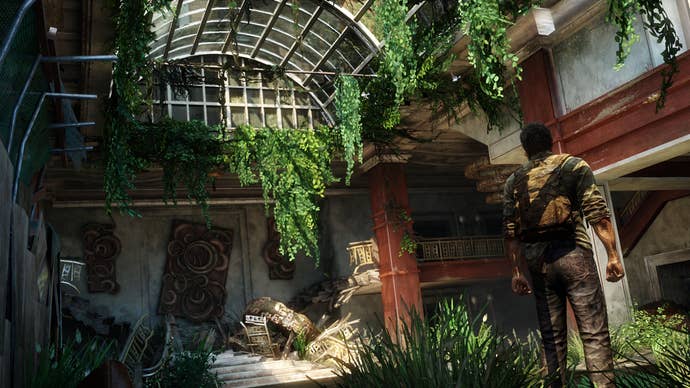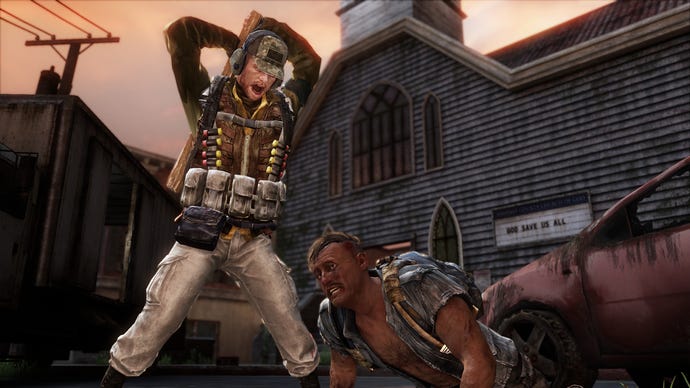Why The Last of Us is the Opposite of Uncharted
Eurogamer's Tom Bramwell gives us a timely reminder not to judge games by their E3 clichés.
This article first appeared on USgamer, a partner publication of VG247. Some content, such as this article, has been migrated to VG247 for posterity after USgamer's closure - but it has not been edited or further vetted by the VG247 team.
If there has been a theme over the past couple of E3s, then perhaps it has been the rush to condemn triple-A game developers for taking the easy route. Consider Ryse, for example - or Saving Private Ryse, as Steven Spielberg's lawyers might have described it, watching the Son of Rome fall sideways during a beach landing and observe his brothers blown to pieces with ringing in his ears. As Rich Stanton put it, "you can tell exactly what this plays like by just looking at it". Playing through The Last of Us, however, is a reminder that sometimes you can't, even when it seems like you really can.
At first glance, The Last of Us seems like another safe bet. Players will cross a post-apocalyptic American landscape (I would say "stop me if this sounds familiar", but then nobody in the world would get beyond this paragraph), fighting zombies as they go, scavenging for weapons and supplies and reading dead people's diaries as they stitch together the details of what's happened to their country. Naughty Dog is one of the most technically proficient of the studios known for delivering worlds like this, but after a series about a quippy explorer who raids caves for mythological treasure (stop me if this - oh forget it) it hardly sounds like they're stretching themselves.
But the truth is that The Last of Us is almost the complete opposite of its stable-mate, the Uncharted series. Those games often put spectacle in front of everything - the developers speak of sections like the train level in Uncharted 2 and the overturning ship in Uncharted 3 with an almost religious fervour, the technical accomplishment pushing everything else into the background. Nathan Drake's story and the current McGuffin and bad guys are great, sure, but mainly in the context of their peerless performance capture. Uncharted 3 was the series' nadir for me in this sense, blinded to terrible gameplay problems (can we talk about them yet, or are we saving that for the Uncharted 4 preview presentations?) and incoherency by the blinkers of its technical sophistication.

That isn't unusual, of course, because a lot of really good games obscure their shallows with laughs and plot twists or, in the case of a lot of games with RPG pretensions, mistake depth and breadth for character, building an encyclopaedia as you play to distract you with how thoroughly the world has been crammed with meaningless detail. To be fair to Naughty Dog's other games - all the way back to Jak and Daxter, perhaps my favourite PS2 game - the developer's skills in other areas elevate its work beyond the rank-and-file, with Uncharted 2 a particular triumph, but the shoe still fits.
A lot of really good games obscure their shallows with laughs and plot twists... or mistake depth and breadth for character.
The first sign of how The Last of Us won't be taking this road is in how plainly it sets itself out. The zombie apocalypse is played so straight that after a while its lack of novelty leaves it firmly in the background. The mechanics of the zombie cycle - bite or cut equals infection equals braaaiiinnzzz within 24 hours - have become as passé to the characters as they are to the player. The music is equally unassuming - sparing, emotive, desolate, rounding out the setting with rarely more than a single instrument; it's a deliberately economical composition that speaks to the musicians' understanding of Naughty Dog's goal.
The understatement they all work towards foregrounds the characters of Joel, the middle-aged Texan smuggler, and Ellie, his snarky teenage travel companion, and it's evident in every detail - even the largest. Half-toppled skyscrapers and hydro-electric plants, beautifully presented and convincing to explore, provoke conversations about each character's past, while diary fragments and discarded letters are particularly effective as collectibles in this game because Joel and Ellie often comment on or discuss them, revealing themselves in the process.
Dialogue is always sparse: Joel is curt and evasive, while Ellie has a hard-done-by teenage bitterness; their grief-worn guardedness makes obvious sense in a dying world where everyone is grieving, but the point is never forced, and neither are the elements of their character that help them to move past that and bond on their journey. The wrong hands might drive the simplicity of that journey into dull cliché, or else reach for the comfort of novelty and science fiction to avoid hanging the game on the authenticity of their relationship, but Naughty Dog's storytelling stands naked at these great heights, and is more convincing for it.

Returning to E3, we shouldn't be surprised not to see more of this stuff during press conferences or even behind closed doors. For one thing, it's very hard. Naughty Dog is one of only a handful of studios that could pull together technical, artistic and storytelling experience at this kind of scale and cost, and Sony is one of the only publishers that would let it stick to the courage of its convictions about how to utilise it. And even then, The Last of Us is rough in places. You won't be instantly located by every enemy in your surroundings as soon as you show an inch of ankle, as you would in Uncharted 3, but you can pick apart the combat and mechanics, and I'm sure the game's fascination with ladders and planks will be an internet meme before sundown.
For another thing, E3 has proclaimed breakthroughs in every category of game-making so many times now that the words have become meaningless, leaving us to judge games by their gore-soaked 90-second trailers or their presence on "sizzle" reels instead. 15-minute demos on show-floor stands do a slightly better job of conveying the truth, but it's still hard to trace the shape of the game that's somewhere underneath the shape of the demo. E3 is the devil's loudspeaker in many respects: you will be heard, but your message will be lost.
The Last of Us, meanwhile, has had 13 hours to impress me, and it has taken advantage. Its singular attention to character and storytelling is at odds with other games, including the studio's own, but as an example of how developers at the peak of their powers can turn genre work away from an easy route and toward something more meaningful, it suggests a future where those snap judgements during glitzy E3-style showcases may less often be proven right. Perhaps there's hope for Ryse after all.
